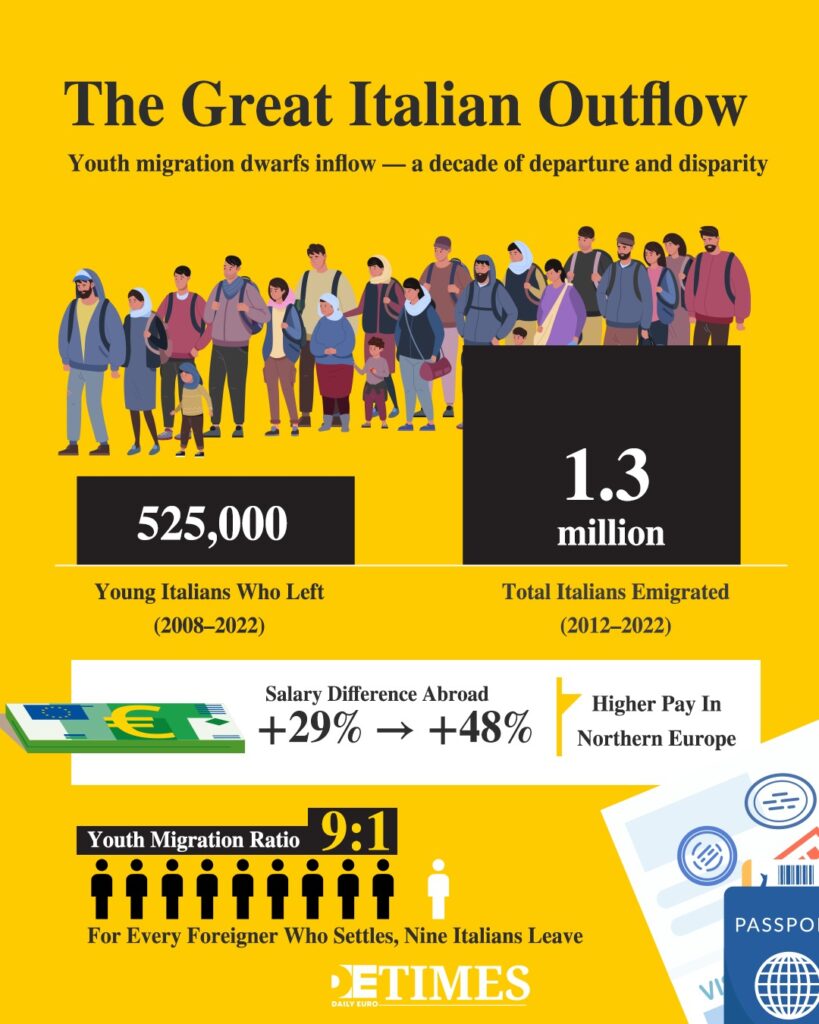The Economic Squeeze Driving an Exodus
The frustration that launched Ora! is rooted in hard numbers. Between 2008 and 2022, 525,000 young Italians left the country looking for better pay and opportunities. In total, over 1.3 million citizens officially moved abroad between 2012 and 2022.
The reason is straightforward: qualified Italians who move to Northern Europe receive salaries 29% to 48% higher. For every young foreigner who settles in Italy, nearly nine young Italians depart.
The “brain drain” is happening against a backdrop of economic stagnation. Italy’s labour productivity grew only 0.2% annually from 1995 to 2024, far behind the EU27 average of 1.2%. From 2019 to 2024, productivity actually shrunk by 0.1% annually. The IMF projects growth will slow to 0.5% in 2025, constrained by an aging population and a skilled worker shortage.
Even for those who stay, work is often precarious. Although youth unemployment fell to 18.7% in July 2025, temporary employment among people aged 15-29 has climbed to 38.2%.
A System That Rewards Loyalty, Not Performance
Research points to a specific cause for the stagnation: management practices. A study from Maryland Smith’s Bruno Pellegrino found that Italian firms tend to base rewards on loyalty and connections.
As information technology began expanding in 1995, many firms lacked the right managers and employees to adopt it well. World Economic Forum surveys ranked Italy last among developed countries for meritocracy.
The practice cost the country an estimated 13% to 16% in productivity growth. Young Italians see the system up close.

A YouTube Proposition Turns Into a Party
The party began unexpectedly during a July 2024 YouTube livestream. Economist Michele Boldrin and entrepreneur Alberto Forchielli were discussing the 525,000 exodus figure from Il Sole 24 Ore. Forchielli stated that young Italians needed a new political home.
Boldrin proposed an idea to viewers: find 1,000 volunteers within 15 days. They hit that target overnight, receiving 9,100 email responses.
The energy quickly took organizational form. The Drin Drin association launched in September 2024 and grew using Discord channels. Within a year, 14,500 people had joined. More than half were under 45.
The founding congress was held from October 10-12, 2025, in Abano Terme. The movement was renamed Ora!, and it elected Boldrin as secretary and Forchielli as president.
Building a “Start-up for Politics”
Ora! is not Italy’s first attempt at a new centre.
In 2022, Carlo Calenda’s Azione and Matteo Renzi’s Italia Viva formed a “third pole” alliance, which obtained 7.8% of the vote. But by the 2024 European Parliament elections, the alliance had fractured. Neither party won any seats, as Renzi earned 3.8% and Calenda 3.2%, both falling short of the 4% threshold. Their public fighting alienated voters.
Ora! seeks to be different, structuring itself around policy processes. Policy is developed collaboratively. Members drafted and amended 17 thematic position papers using GitHub, treating policy creation like software development.
The party positions itself in the centrist-liberal space. Forchielli described it as a “start-up for politics” and told journalists, “We’re much more concentrated on innovation and the practical way of handling problems.”
The method has assembled an unusual coalition. Finance professionals are working with ex-communists, and young economists from the liberalist LiberiOltre association are alongside researchers who once distributed Lotta Comunista. The founders, Boldrin (69), who teaches at Washington University in Saint Louis, and Forchielli, who spent years working in China, plan to step aside in two or three years to let others lead.
A Pragmatic Platform and an Uncertain Future
The party’s congress approved formal theses on productivity, education, demographics, bureaucratic simplification, tax reform, and industrial policy.
Boldrin declared, "We'll give precise indications to politics, inside and outside Parliament. Immediate answers are needed on growth, innovation, employment and demographics to restore a future to young people."
The party has been active, organizing over 100 events across Italy and abroad. Its internal delegate elections saw a 75% voter turnout, high for a new organization.
A core part of their platform advocates for greater European integration. The advocacy occurs as Italy’s youth flee to northern Europe, a movement some say resembles a colonial extraction: educated workers trained by Italy leave, and their economic vitality flows north.
The real test is to come. With the 2027 elections on the horizon, Italian voters will evaluate if Ora! is truly different. The party must translate its GitHub-drafted policies into legislative action. Youth movements often grab attention but then fade; Ora! built its structure quickly, but its long-term sustainability is not guaranteed.
The 525,000 young people who left are an investment in education lost, a family network broken, and economic potential exported. Ora! was born from that exodus. Whether it can reverse the flow depends on turning its grassroots enthusiasm into effective governance.
Keep up with Daily Euro Times for more updates!
Read also:
Genuine Love or Scandal: How a Intersex Romance Shakes Poland
Milan’s Expat Boom: Are They Bringing Their ‘Best’?
From Sweden to Türkiye: The Stark Gender Divide in Unpaid Work






